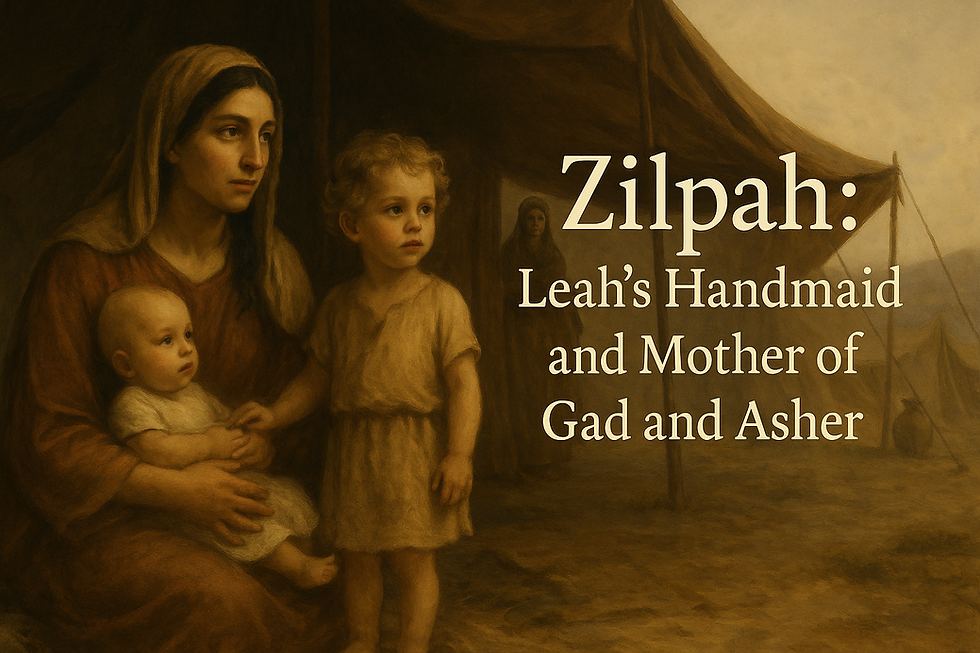Bilhah: Rachel’s Handmaid and Mother of Dan and Naphtali
- Bible Believing Christian

- Sep 5, 2025
- 3 min read

Bilhah: Rachel’s Handmaid and Mother of Dan and Naphtali
Bilhah, though often overlooked in the larger story of Genesis, played a significant role in the formation of Israel. As Rachel’s handmaid, she was given to Jacob to bear children on Rachel’s behalf when Rachel struggled with barrenness. Through Bilhah, Jacob became the father of Dan and Naphtali, two of the twelve tribes of Israel. Her story reflects the cultural customs of the ancient world, the desperation of Rachel, and the complexity of Jacob’s household.
Name & Etymology
The name Bilhah (בִּלְהָה, Bil·hāh, pronounced bil-hah) may mean “timid” or “troubled.” In the Septuagint, her name appears as Balla (Βαλλα). The meaning underscores her role as a servant drawn into the conflicts of others rather than acting on her own accord.
Biblical Narrative (The Story)
Rachel, desperate for children, said to Jacob: “Take my maid, Bilhah, and sleep with her. She will bear children for me, and through her I can have a family, too” (Genesis 30:3, NLT). Jacob agreed, and Bilhah bore him two sons.
The first was Dan, named by Rachel: “God has vindicated me! He has heard my request and given me a son” (Genesis 30:6, NLT).
The second was Naphtali, named by Rachel: “I have struggled hard with my sister, and I’m winning!” (Genesis 30:8, NLT).
Bilhah later appears in Genesis 35:22, when Reuben, Jacob’s firstborn, slept with her. This sin caused Reuben to lose his birthright (Genesis 49:3–4; 1 Chronicles 5:1).
Though a servant, Bilhah’s children became fully recognized among the twelve tribes of Israel, showing that God’s covenant promises extended even through unexpected and complicated circumstances.
Historical & Cultural Context
In the ancient Near East, it was common for barren wives to give their maidservants to their husbands as surrogate mothers. This practice, while culturally accepted, often led to rivalry and bitterness within families—as seen with Sarah and Hagar before Rachel and Bilhah.
Bilhah’s position was complex: she was a servant, yet her children were counted as Rachel’s. This reflects both her low social standing and the high significance of her role in God’s covenant family.
Character & Themes
Bilhah’s story highlights themes of desperation, rivalry, and God’s providence. She is not depicted as acting by her own will but as caught in the rivalry between Rachel and Leah.
Her life shows how God worked even through human schemes and cultural customs to build the nation of Israel.
Connection to Christ
Bilhah’s sons, Dan and Naphtali, became tribes within Israel, part of the larger story that led to Christ. Though she was a servant, her children were grafted into the covenant people, foreshadowing how Christ would later welcome the lowly and the outsiders into His kingdom.
Her story reminds us that God works through the overlooked and marginalized, weaving them into His redemptive plan.
Theological Significance
Bilhah’s role demonstrates that God’s purposes are not hindered by human rivalry or cultural customs. Even when Rachel acted out of desperation, God used the situation to expand the covenant family.
Her story also reminds us that God’s plan includes those on the margins. A servant’s children became tribes in Israel, emphasizing God’s power to redeem and elevate the overlooked.
Myths & Misconceptions
One misconception is that Bilhah was simply incidental. In reality, her role was essential—two tribes of Israel trace back to her.
Another misconception is that her relationship with Jacob elevated her status. In fact, she remained a servant, and her story reflects the tension of being both central and marginalized.
A further misconception is that her story is one of shame only. While Reuben’s sin with her carried disgrace, God still honored her legacy through the tribes of Dan and Naphtali.
Application
Bilhah’s story encourages us that God works through even complicated, messy, and unjust circumstances to fulfill His purposes.
Her life reminds us that those who feel overlooked or powerless are not forgotten by God. He weaves their lives into His redemptive plan.
Conclusion
Bilhah, Rachel’s handmaid, became the mother of Dan and Naphtali, two tribes of Israel. Though a servant caught in the struggles of others, she was included in the covenant story. Her life reflects God’s compassion for the marginalized and His power to work through imperfect human situations to bring about His purposes in Christ.


